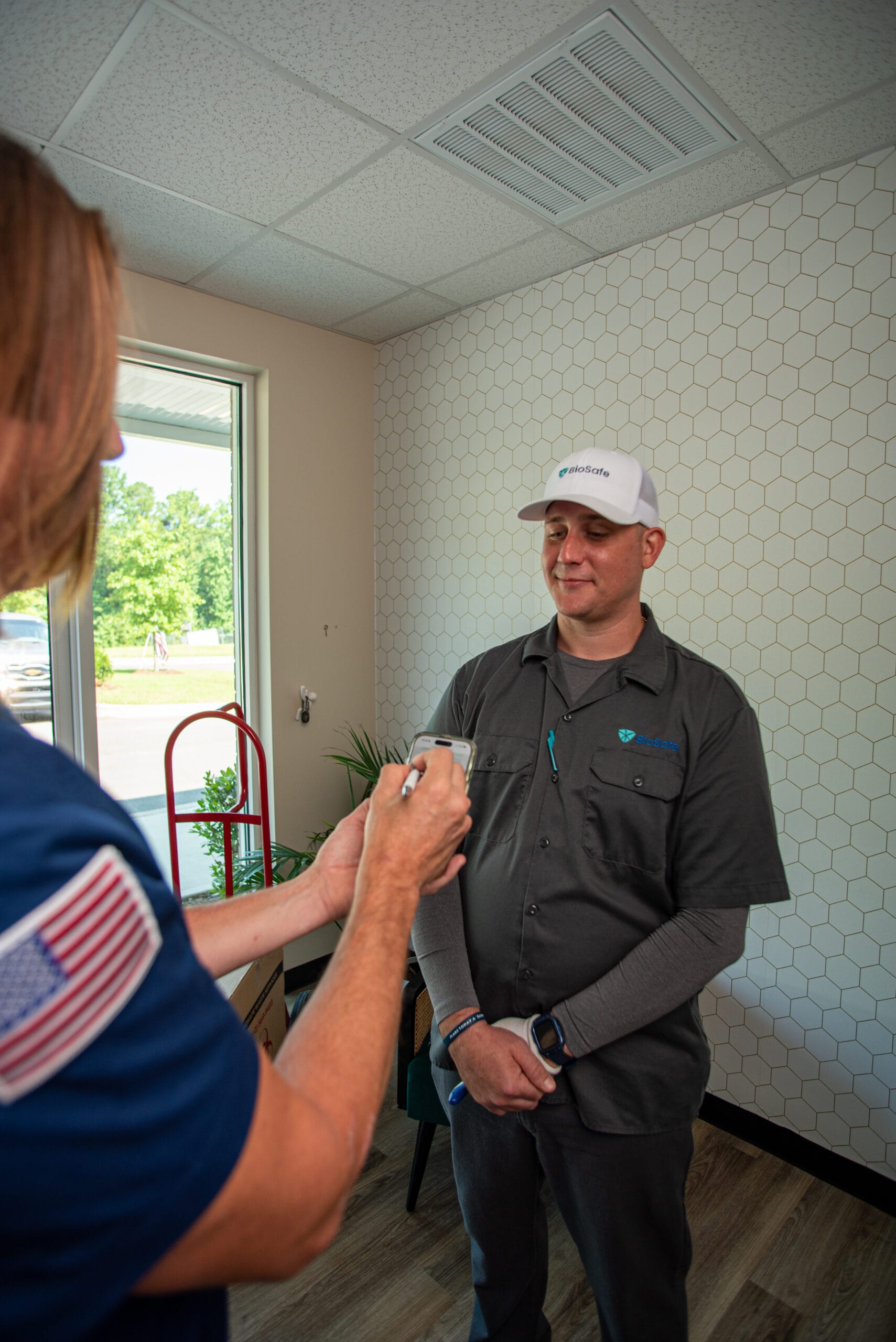Healthcare workers in North Carolina face daily risks from bloodborne pathogens such as hepatitis B, hepatitis C, and HIV. Federal regulators, led by OSHA, have long recognized these dangers, and the requirements for handling potentially infectious materials are clear. For medical practices, compliance is not just about avoiding fines—it’s about protecting staff, safeguarding patients, and maintaining the reputation of the practice.
This guide outlines the practical steps medical offices, clinics, and other providers must take to stay compliant while also reducing risk. Biosafe Waste Services can help your practice develop its own plan for medical waste. Check out our page on medical waste or reach out to us through our contact page.
Understanding Bloodborne Pathogens
Bloodborne pathogens are infectious microorganisms found in human blood and certain body fluids. Even a small exposure from a needlestick or a splash to the mucous membranes can transmit disease. OSHA’s Bloodborne Pathogens Standard (29 CFR 1910.1030) requires that any workplace with occupational exposure to blood or OPIM (other potentially infectious materials) must have safeguards in place.
For medical practices, that means:
- Identifying which employees face exposure risk (doctors, nurses, phlebotomists, cleaning staff, etc.).
- Training staff annually on safe practices and updates.
- Ensuring that protective measures—like gloves, face shields, and sharps containers—are consistently available and used.
The Exposure Control Plan (ECP)
Every medical practice must have a written Exposure Control Plan, reviewed and updated at least once a year. The ECP is the backbone of compliance. It should:
- Identify exposure risks: Which tasks and job classifications involve potential contact with blood or OPIM.
- Outline protective measures: Use of personal protective equipment (PPE), safer medical devices, and engineering controls like sharps containers.
- Establish safe work practices: No recapping of needles, proper hand hygiene, immediate cleanup of spills.
- Provide hepatitis B vaccinations: Employers must offer the HBV vaccine series free of charge to at-risk employees.
- Define post-exposure procedures: Steps to take if an employee is exposed, including medical evaluation and follow-up.
Action Item for Practices: Assign a compliance officer or manager to review and update the ECP annually, document training, and keep signed acknowledgement forms from employees.
Medical Waste Disposal and Bloodborne Pathogen Safety
One of the most visible and high-risk parts of pathogen compliance is medical waste management. Improper disposal not only risks staff exposure but also opens a practice to costly regulatory penalties.
Here are key requirements for North Carolina practices:
- Sharps disposal: All used needles, syringes, and other sharps must go into puncture-resistant, leak-proof, and labeled sharps containers. Never overfill containers.
- Biohazard waste segregation: Materials saturated with blood, such as gauze, bandages, and gloves, must be placed in red biohazard bags inside designated containers.
- Pharmaceutical waste: Non-hazardous medications should be placed in approved blue and white containers. Controlled substances must follow DEA disposal rules.
- Storage: Waste awaiting pickup should be sealed, labeled, and kept in a secure area away from patient access.
- Manifests and documentation: Practices must retain shipping manifests and treatment records for medical waste disposal.
Action Item for Practices: Train staff on what waste goes where. Partner with a licensed medical waste vendor, like Biosafe, to ensure compliant pickup, transport, and disposal.
Protecting Staff and Patients
Compliance is not only about following OSHA and state rules—it’s about cultivating a safe environment. Best practices include:
- Ongoing training: Provide interactive training on bloodborne pathogens at least annually.
- Readily available PPE: Gloves, gowns, and eye protection should be stocked in all procedure areas.
- Emergency protocols: Have clear instructions for spills, exposures, and sharps injuries posted in staff areas.
- Recordkeeping: Maintain documentation of training, ECP reviews, exposure incidents, and waste manifests for OSHA and state inspections.
Why Compliance Matters
Non-compliance with OSHA’s Bloodborne Pathogens Standard can result in fines that exceed $15,000 per violation. More importantly, a lapse in safety can lead to staff illness, patient harm, or public trust issues. A strong compliance program protects your practice legally and ethically.
At Biosafe, we provide not only medical waste disposal but also OSHA bloodborne pathogen training to help practices stay compliant. Partnering with a local, North Carolina-based vendor means you’ll have the resources, guidance, and responsiveness to stay ahead of risks.
Bloodborne Pathogens & Medical Waste Compliance Checklist
For North Carolina Medical Practices
Exposure Control Plan (ECP)
- Written plan in place and updated annually
- Exposure risks identified by role and task
- Staff acknowledgements and training records kept on file
Staff Training
- Bloodborne pathogens training completed annually
- Post-exposure procedures explained and accessible
- Spill response and sharps injury protocols posted in staff areas
Vaccinations & PPE
- Hepatitis B vaccine series offered free to at-risk staff
- Gloves, gowns, masks, and eye protection stocked in procedure areas
- Safer sharps devices provided where possible
Medical Waste Disposal
- Sharps in puncture-proof, labeled sharps containers
- Blood-soaked materials in red biohazard bags
- Non-hazardous pharmaceuticals in blue/white containers
- Controlled substances disposed of according to DEA rules
- Waste stored in a locked or secure area prior to pickup
Recordkeeping & Documentation
- OSHA training logs and ECP review records kept for inspection
- Medical waste manifests and treatment records filed and stored
- Incident reports completed for any staff exposure
Vendor Partnership
- Licensed medical waste vendor provides compliant transport and disposal
- Pickup schedules reviewed and adjusted to prevent container overflow
- Vendor provides access to manifests and compliance documentation
Sources & References
- OSHA Bloodborne Pathogens Standard: OSHA 29 CFR 1910.1030
- North Carolina Medical Waste Guidance: NC DEQ – Medical Waste
- CDC – Bloodborne Infectious Diseases: CDC Bloodborne Pathogens

